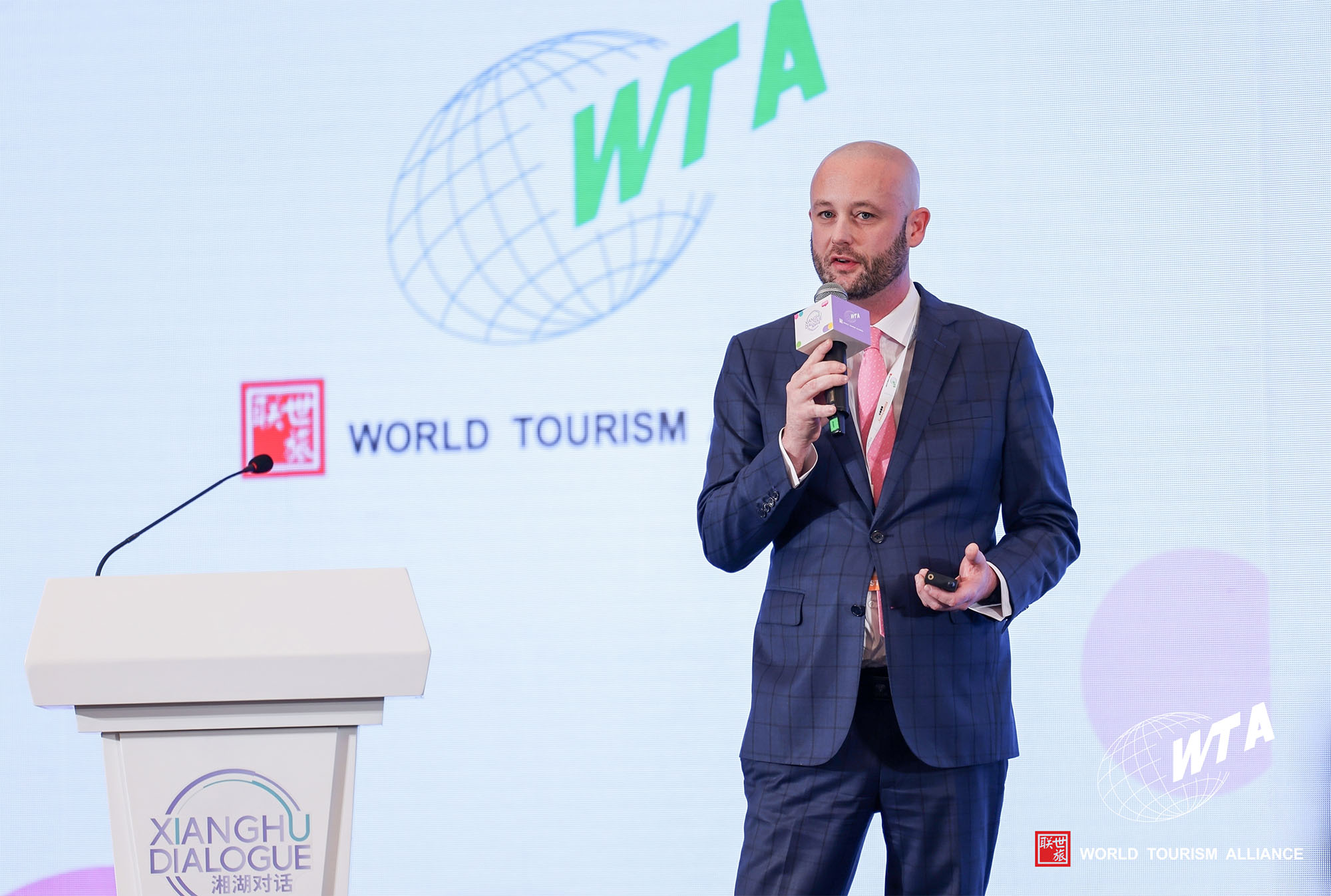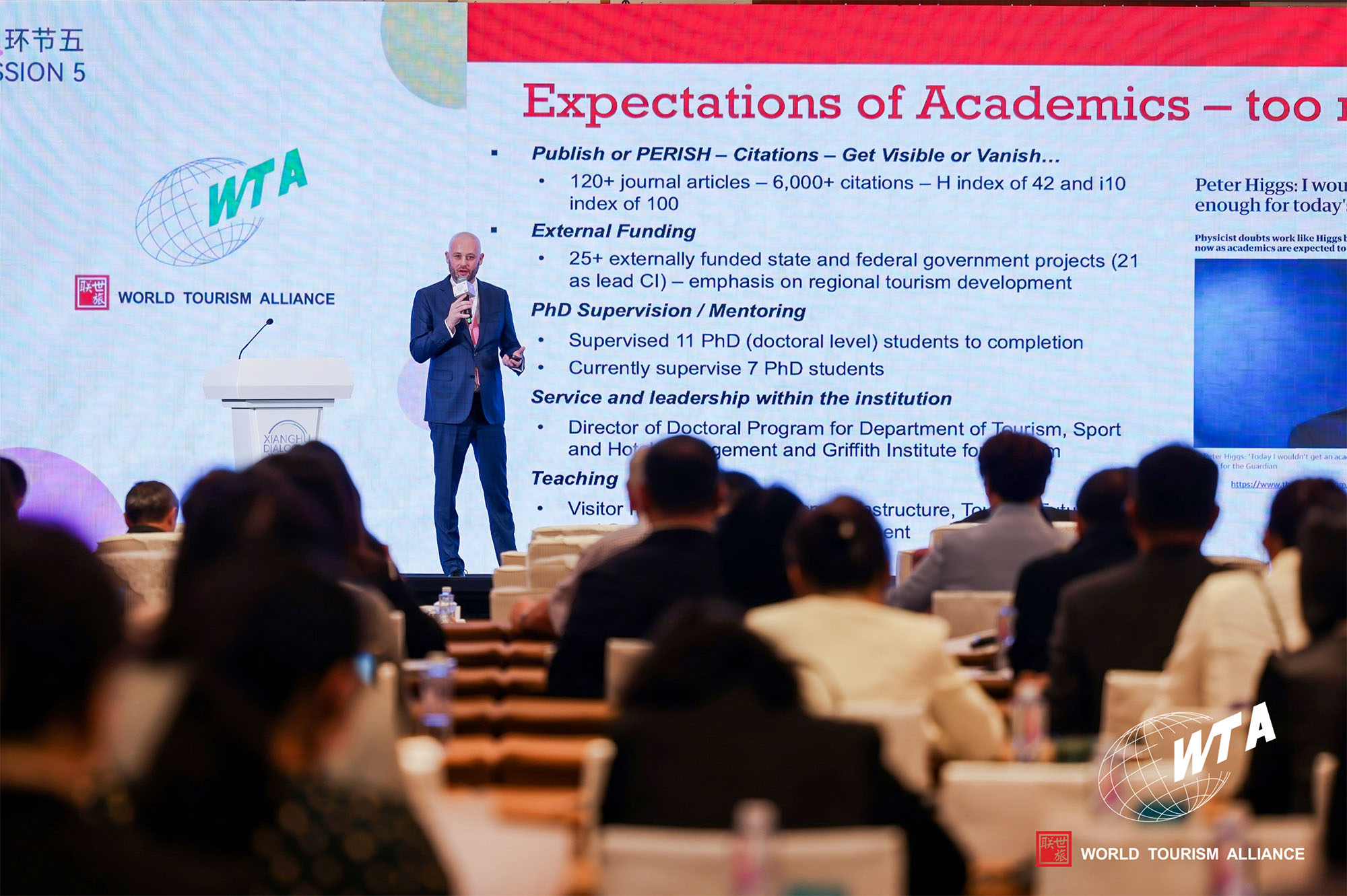2024-11-18
October 31, at the WTA· Xianghu Dialogue 2024 in Sanya, Hainan, Dr. Brent MOYLE, Professor of Department of Tourism, Sport and Hotel Management of Griffith University, delivered a keynote speech on "Cultivating Future Focused Talent in Tourism and Hospitality Graduates with Academic Entrepreneurship". Below is a summary of the key points discussed.

The Department of Tourism, Sport and Hotel Management at Griffith University ranks among the world’s top programs and is one of Australia’s leading tourism research institutions. Our interdisciplinary team is dedicated to solving complex issues in the tourism industry through cutting-edge research.
Reflecting on my career, academic research has always been my core focus. In 2010, I pursued my Ph.D. at Monash University, followed by three years of academic work. I later served as Associate Dean at Griffith Institute for Tourism (GIFT) before becoming an associate professor at the University of the Sunshine Coast, where I held roles as Dean and Graduate School Director. Currently, I am a Visiting Professor at The Hong Kong Polytechnic University (PolyU). This diverse experience has deepened my understanding of the dynamic and demanding nature of academic research and how academic research can contribute to economic and social development.
Tourism is inherently multidisciplinary, drawing theoretical and research frameworks from sociology, anthropology, psychology, geography, and economics. These well-established academic foundations provide tourism studies with a solid platform for development. Tourism serves as both a bridge connecting societies and the wider world and as an open window that invites expertise from diverse fields. The industry plays a crucial role in driving regional economies, significantly enhancing the living standards of local communities. In Australia, both state and federal governments place great emphasis on the development of rural tourism, creating ambitious goals and strategic plans for the coming years. Against this backdrop, universities face critical questions: How can they actively contribute to rural tourism development? How can they enhance student engagement in these efforts? And, most importantly, how can they ensure students achieve meaningful academic and practical outcomes during their educational journey? These are vital challenges that demand thoughtful consideration and innovative solutions.
One notable example is our decade-long collaboration with a rural region in Australia, involving 7 Ph.D. students, 24 master’s students, and 47 undergraduates. Students were encouraged to participate in developing the region’s overall tourism strategy, conducting on-site research into untapped tourism products and resources. They engaged with 180 community stakeholders, reimagined tourism products and experiences, and collaborated with architecture students to design spatial layouts for the area as part of the regional tourism sustainable development plans. The centerpiece of this initiative is the "Cosmos Centre" project, which features four observation decks offering unparalleled stargazing experiences. Students assessed the market potential of this attraction and submitted detailed recommendations to local councils. Future plans include additional student involvement in designing a planetarium and enhancing the "Dark night sky" experience to further the appeal of this destination. The project also includes the construction of a cosmic dome terrace, a large telescope observation center, and an immersive theater. These attractions are supported by innovative storytelling activities, such as fireside astronomy discussions, to connect visitors with the wonders of space. Thoughtful lighting and landscaping design enhance the site’s tourism appeal, aiming to create a memorable and unique astronomical exploration destination.
Our students have also played key roles in developing various innovative attractions. For instance, a three-year project focused on redeveloping a WWII-era air force base into a vibrant tourist site. During the project, we encouraged students to actively participate in creating immersive experience settings and drafting tourism guides tailored to market needs. These efforts allowed visitors to explore the full scope of the air force base during World War II and provided an authentic recreation of wartime life. In 2020, the project introduced a new visitor center equipped with advanced 3D scanning technology, significantly enhancing digital and virtual reality experiences for guests. Students also worked closely with stakeholders to curate a series of unique and engaging events, contributing to the site’s growing popularity. By 2023, the base had attracted tens of thousands of visitors, becoming a successful case study in tourism redevelopment. The project was guided by a comprehensive vision, which included four main goals and ten transformative initiatives. It successfully secured 8 million AUD in federal funding, showcasing the value of integrating academic innovation with tourism development to achieve sustainable and impactful results.

Our commitment extends beyond single projects. We collaborate closely with local governments to establish evaluation frameworks and strategies for sustainable development. Students play a key role, developing interdisciplinary perspectives, honing communication skills, and understanding community needs. They learn to transcend traditional tourism roles, becoming sustainability advocates and community leaders. As educators, it is our responsibility to embed sustainability into the curriculum, instilling these values in future generations. By doing so, we can help them develop a mindset focused on sustainability, foster a spirit of altruism, promote community engagement, and encourage active participation in various social practices.